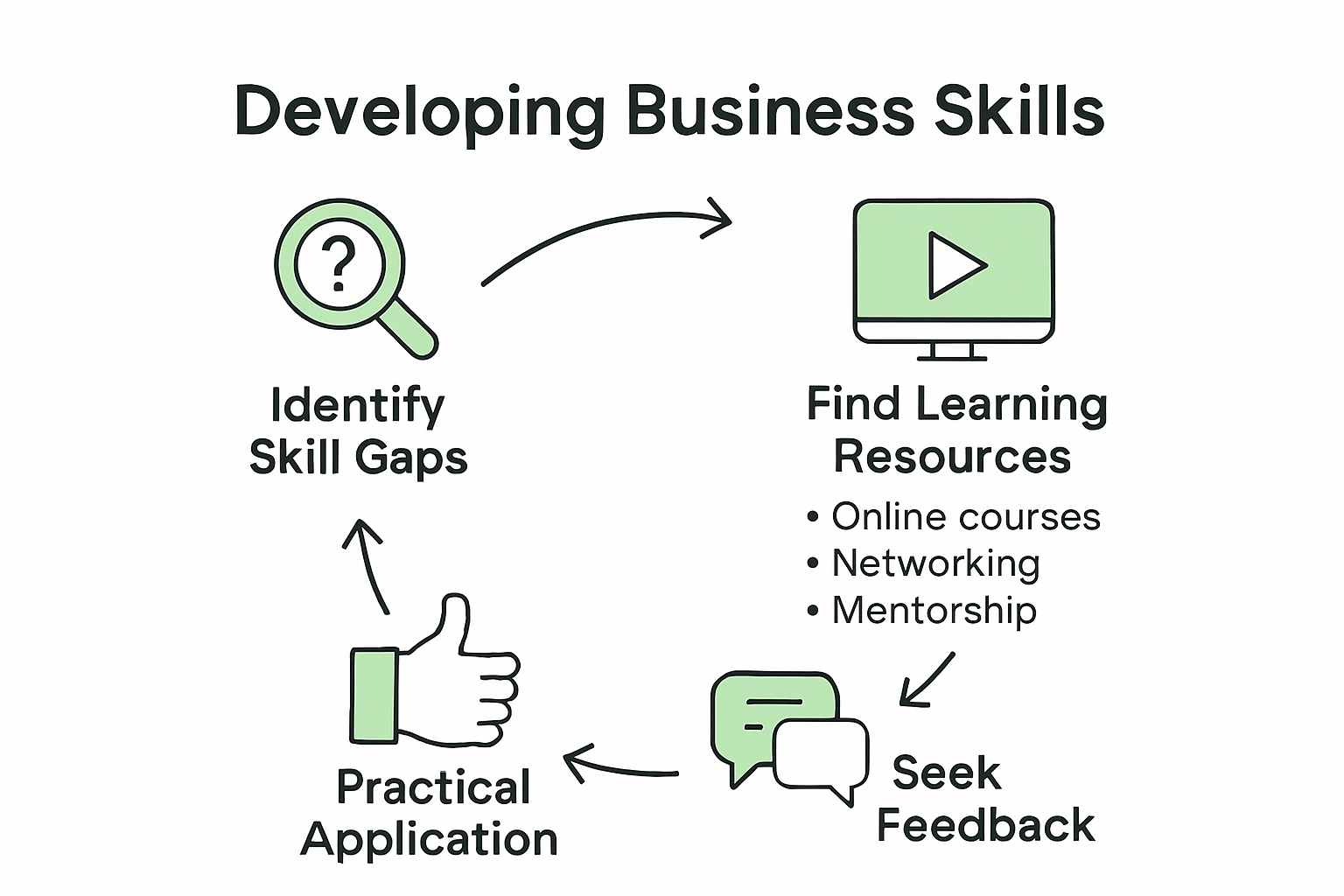
Building Entrepreneurial Mindset: Steps for Beginners in 2025
Learn the essentials of building entrepreneurial mindset so you can turn ideas into action, whether you’re a millennial, developer, or new grad in 2025.
Building an entrepreneurial mindset sounds like a distant dream for most beginners. Yet studies show that entrepreneurial traits can be learned—not inherited—and nearly 80 percent of entrepreneurs develop key skills after launching their first project. People expect successful founders to be born with some secret sauce. But the truth is, even the most accomplished entrepreneurs faced self-doubt and started by taking small, messy steps—just like everyone else.
Table of Contents
Understanding the Entrepreneurial Mindset
The Core Components of an Entrepreneurial Mindset
Cultivating Entrepreneurial Thinking
Overcoming Self-Doubt and Fear of Starting
Recognizing and Reframing Negative Thoughts
Building Confidence Through Strategic Action
Developing Business Skills on Your Own
Learning Through Strategic Self-Education
Practical Skill Development Strategies
Turning Ideas Into Actionable Side Projects
Frameworks for Idea Validation
Prototyping and Iterative Development
Quick Summary
Takeaway Explanation Develop an Entrepreneurial Mindset Cultivate adaptive thinking and resilience to navigate challenges effectively. Embrace failures as essential learning opportunities to foster growth. Overcome Self-Doubt with Action Combat self-doubt by breaking down goals into manageable steps, allowing small wins to build confidence and motivation. Engage in Strategic Self-Education Continuously seek diverse learning experiences beyond traditional education, utilizing online courses and real-world applications. Utilize Idea Validation Frameworks Systematically assess ideas through market research and prototypes to ensure valuable and actionable projects before significant investment. Embrace Iterative Development Use lean prototypes to test and refine ideas through feedback, turning abstract concepts into practical solutions through gradual improvements.
Understanding the Entrepreneurial Mindset
Entrepreneurship is more than just starting a business. It’s a comprehensive approach to thinking, problem solving, and navigating challenges with creativity and resilience. Our comprehensive guide on problem solving strategies can provide deeper insights into this mindset.
The Core Components of an Entrepreneurial Mindset
Building an entrepreneurial mindset requires understanding its fundamental psychological and behavioral characteristics. Research from academic experts reveals that an entrepreneurial mindset is not an innate trait but a set of skills and perspectives that can be deliberately developed.
Key components include adaptive thinking, risk tolerance, opportunity recognition, and persistent problem solving. Entrepreneurs don’t just react to circumstances they proactively create solutions. They view challenges as opportunities for innovation rather than insurmountable obstacles.
Cultivating Entrepreneurial Thinking
Academic studies demonstrate that entrepreneurial attitudes can be systematically developed through targeted education and practice. This means anyone can enhance their entrepreneurial capabilities by adopting specific mental frameworks and practicing strategic thinking.
Successful entrepreneurs share common cognitive patterns. They embrace uncertainty, maintain a growth mindset, and continuously learn from both successes and failures. They understand that failure is not a final destination but a crucial learning experience that provides insights for future endeavors.
Developing an entrepreneurial mindset requires deliberate practice. This involves challenging existing thought patterns, seeking diverse perspectives, and maintaining an open and curious approach to problem solving. By consistently pushing personal boundaries and embracing calculated risks, individuals can transform their thinking and unlock entrepreneurial potential.
To help clarify the foundational elements of an entrepreneurial mindset, the following table summarizes its core psychological and behavioral components and how they contribute to entrepreneurial success.
Component Description Contribution to Success Adaptive Thinking Ability to adjust thinking in response to change and uncertainty Promotes innovation and flexibility Risk Tolerance Willingness to take calculated risks and face potential failures Enables innovation and new ventures Opportunity Recognition Identifying and acting on new business possibilities and trends Finds and seizes business openings Persistent Problem Solving Continuous effort to find solutions despite setbacks Ensures progress and resilience Growth Mindset Embracing learning from both success and failure Fosters ongoing self-improvement
Overcoming Self-Doubt and Fear of Starting
Every aspiring entrepreneur faces an internal battle with self-doubt and fear. These psychological barriers can paralyze potential business creators, preventing them from taking crucial first steps. Learn strategies for conquering entrepreneurial challenges and transform your mindset.
Recognizing and Reframing Negative Thoughts
According to experts at Emerge and Rise, recognizing self-doubt is the first critical step in overcoming it. Entrepreneurs often wrestle with intrusive thoughts like “I’m not good enough” or “This will never work.” These negative narratives can become self-fulfilling prophecies if left unchecked.
Reframing these thoughts requires intentional cognitive restructuring. Instead of viewing challenges as insurmountable obstacles, successful entrepreneurs learn to see them as opportunities for growth. This means transforming statements like “I might fail” into “This is a chance to learn and improve my approach.” Developing this mental resilience is not about eliminating fear but managing it constructively.
Building Confidence Through Strategic Action
Research from The Open University suggests that confidence is built through purposeful action. Entrepreneurs can combat self-doubt by breaking down their goals into smaller, manageable steps. This approach makes the entrepreneurial journey less overwhelming and provides frequent opportunities for small wins.
Starting with low-risk experiments can help build momentum. This might involve creating a minimal viable product, conducting market research, or networking with other entrepreneurs. A study examining entrepreneurial intentions highlights how supportive environments and incremental progress can significantly boost an individual’s perceived ability to succeed.
Overcoming self-doubt is an ongoing process. It requires consistent practice of self-compassion, seeking constructive feedback, and maintaining a growth mindset. Successful entrepreneurs understand that fear is a natural part of the journey. They learn to view it as a signal of personal growth rather than a stop sign. By developing resilience, staying curious, and taking consistent action, you can transform self-doubt from a paralyzing force into a catalyst for personal and professional development.
The table below outlines practical actions and mindset shifts for overcoming self-doubt and building entrepreneurial confidence as described in the article.
Challenge Mindset Shift or Action Purpose/Benefit Self-doubt Break goals into manageable steps Reduces overwhelm, builds momentum Fear of failure Reframe as opportunity to learn Encourages growth mindset Negative self-talk Practice cognitive restructuring Builds resilience Lack of confidence Start with low-risk experiments Achieves frequent small wins Need for support Seek constructive feedback and a supportive environment Boosts confidence and learning
Developing Business Skills on Your Own

Building a successful entrepreneurial career requires continuous skill development and self-directed learning. Discover innovative strategies for finding unique business opportunities that can accelerate your entrepreneurial journey.
Learning Through Strategic Self-Education
According to resources from the National Library Board, developing entrepreneurial skills is a deliberate and structured process. It involves more than acquiring theoretical knowledge. Entrepreneurs must actively seek out diverse learning experiences that challenge their existing understanding and expand their capabilities.
This means going beyond traditional educational pathways. Online courses, webinars, podcasts, and industry conferences offer flexible learning opportunities. Harvard Business School experts emphasize that key skills like financial literacy, networking, and pattern recognition can be systematically developed through intentional practice and exposure.
Practical Skill Development Strategies
Effective skill building requires a multifaceted approach. Start by identifying specific areas for improvement. Financial management, communication, negotiation, and digital marketing are critical competencies for modern entrepreneurs. Engage in hands-on projects that allow you to apply theoretical knowledge in real-world contexts.
Emerging research on AI-enhanced entrepreneurship education suggests that technology can provide powerful scaffolding for skill development. However, the most successful entrepreneurs combine technological tools with human mentorship and experiential learning. This means seeking feedback, embracing constructive criticism, and maintaining a growth mindset.
Developing business skills is an ongoing journey of curiosity and adaptability. It requires patience, persistence, and a willingness to step outside your comfort zone. By creating a personalized learning ecosystem that combines structured education, practical experience, and continuous self-reflection, you can build a robust toolkit of entrepreneurial capabilities. Remember that skills are muscles they grow stronger with consistent exercise and strategic challenge.
Turning Ideas Into Actionable Side Projects
Transforming entrepreneurial ideas from abstract concepts into tangible projects requires strategic planning and disciplined execution. Explore proven techniques for generating innovative business concepts that can become successful side ventures.
Frameworks for Idea Validation
Harvard’s Project Zero approach emphasizes the critical importance of rigorous idea validation before significant investment. Aspiring entrepreneurs must develop a systematic method to assess the potential of their ideas. This involves breaking down concepts into testable hypotheses and creating minimal viable prototypes that can demonstrate core value propositions.
Effective idea validation involves multiple stages. First, conduct thorough market research to understand potential customer needs. Engage with potential users through surveys, interviews, and preliminary product demonstrations. The goal is not perfection but gathering meaningful feedback that can refine and improve the initial concept.
Prototyping and Iterative Development

Research from the University of Dundee highlights the importance of structured project planning when transforming ideas into actionable initiatives. Start by creating a lean prototype that captures the essential features of your concept. This could be a simple landing page, a basic mobile app, or a hand-drawn mockup that illustrates your solution.
Iterative development is key to successful side projects. Begin with the smallest possible version of your idea that can provide meaningful insights. A study on professional idea development suggests that peer feedback and collaborative refinement significantly enhance the quality of initial concepts. Seek input from potential users, mentors, and fellow entrepreneurs who can offer constructive criticism and alternative perspectives.
Turning ideas into actionable side projects requires more than just creativity. It demands a disciplined approach to experimentation, learning, and continuous improvement. Successful entrepreneurs understand that initial ideas are rarely perfect. The magic happens in the iteration process where concepts are tested, refined, and gradually transformed into viable solutions. By maintaining flexibility, staying open to feedback, and consistently taking small, measurable steps, you can bridge the gap between imagination and execution. Remember that every successful business started as a simple idea waiting to be developed with patience, persistence, and strategic thinking.
Frequently Asked Questions
What is an entrepreneurial mindset?
An entrepreneurial mindset is an approach to thinking that includes creativity, resilience, risk-taking, and problem-solving. It allows individuals to see challenges as opportunities and encourages proactive behavior in creating solutions.
How can beginners develop an entrepreneurial mindset?
Beginners can develop an entrepreneurial mindset by practicing adaptive thinking, embracing a growth mindset, and engaging in strategic self-education through online courses and real-world experiences. Additionally, maintaining curiosity and embracing failures as learning opportunities can foster growth.
What steps can I take to overcome self-doubt when starting a business?
To overcome self-doubt, break down your goals into manageable steps, practice cognitive restructuring by reframing negative thoughts, and seek supportive feedback. Starting with low-risk experiments can also help build confidence as you gain small wins along the way.
How do I turn my ideas into actionable projects?
Start by validating your ideas through market research and feedback from potential users. Create lean prototypes to test your concepts and focus on iterative development, refining your ideas based on user input and real-world insights.
Ready to Build Your Entrepreneurial Mindset into Real Results?
You have just learned that developing an entrepreneurial mindset is not something you are born with but something you build step by step. If you feel overwhelmed by self-doubt or unsure how to turn your ideas into action, you are not alone. Many beginners struggle with gaining confidence, identifying the right business skills, and knowing how to move forward without wasting time or energy. The desire to transform thoughts into tangible projects can easily stall without clear direction or feedback.
That is where siift can make all the difference. Our platform acts as your personal guide through every stage of your entrepreneurial journey. Siift uses intuitive AI to give you customized feedback, actionable steps, and honest insights so you never have to wonder what to do next. Take what you have learned from our problem solving strategies and put it into practice with prioritized actions and support. Start de-risking your founder journey today by joining siift and discover how easy it is to move from mindset to momentum. Your future business can start growing right now.
Recommended
blog | siift | Business Problem Solving for New Entrepreneurs in 2025
blog | siift | Creative Thinking Exercises for Future Entrepreneurs 2025
blog | siift | How to Find Business Ideas in 2025: Proven Steps for Students and New Grads
blog | siift | How to Set Business Goals in 2025: A Guide for New Entrepreneurs